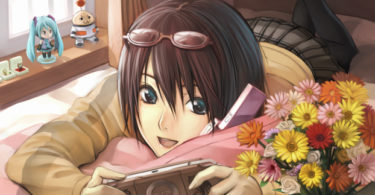A frank interview with an eroge industry insider reveals some interesting tidbits, with the demands of moe marketing evidently precluding much in the way of innovation.
An abridged version of Siliconera’s lengthy interview with an anonymous eroge distributor is reproduced below:
You said that the market is flooded but also that there are a limited number of customers actually making purchases.
Do you think this leads to a tendency on the part of developers to make the same kind of game over and over again because there’s a higher chance of selling product this way?
For instance, it seems like we’re seeing a lot of moe style games these days…
Yes, I see the developers making the same kind of game over and over, because that’s actually what the consumer wants and what sells.
One game developer we work with is well known for their school adventure title [probably the endlessly rehashed Da Capo]. Now, they have been releasing many versions and expansions for this series.
However, if you were a fan of any series, wouldn’t you want to enjoy the same characters and world setting rather than putting in the effort to move on to a completely newer series, and risking not enjoying it? (This is called “hitting a landmine” in eroge purchase lingo)
But its not like some companies aren’t trying other things out. For example, some companies are trying out different genres within the bishoujo game market, such as a RPG-styled adventure games.
Even though people put in quite an effort to develop and promote these games, the demand for known franchises is still much greater.
The word “moe” is pretty broad, but it is a necessary element in an h-game that sells. You can even say that a game didn’t sell because it wasn’t moe enough!
Enjoying a fun time with the characters during an awesome story could be one type of moe, but some people prefer titles where they put forth a certain fetish (such as younger sister, childhood friend, etc.) before anything, and that’s moe to them. Nevertheless, it’s certain that the ones with the prettiest art style have an advantage.
One factor you can’t forget in the h-game market is that the games are expensive. A normal full price of a game goes for 8,800 yen (that’s 9,240 yen with tax included). That’s over 100 U.S. dollars with today’s exchange rate.
That’s why the consumers can only purchase a limited number of games each month, even making use of the second-hand market. Not to mention, these games take time to beat.
Recently, it’s not uncommon to see developers making smaller games that come out at a faster pace, too — sometimes in increments of 3 months.
It may sound weird, but in this industry, unless the game is superbly good and receives perfect reviews afterwards, the number of pre-orders determine the value and life of a title, because that’s the only time we can actually borrow the space to promote the game at the stores and media.
So, if reducing prices and making smaller games isn’t an option in your opinion, what can you do in order to expand the audience for the genre? Japan isn’t reproducing at a very high rate.
In this situation, when the existing market is so saturated, what measures do you think can be taken to help make the niche more profitable? Are the publishers you’ve worked with thinking of long-term plans in this regard?
Actually, I personally think this industry has reached its limit in terms of the consumer fan base.
We’ve done everything in terms of marketing, and now companies are simply eating into each other’s profits, in which case its maximum size will never grow bigger. Not to mention, the same customer base is usually also a fan of console games and anime.
The developers’ goal is still to make a good and attractive game, but now they are putting in more effort than ever to keep the fans they gained entertained as long as possible, so they will be interested enough to try out their future titles.
An almost total lack of innovation, whether technical or narrative, and an evident lack of interest in new markets, domestic or international, seem more of a barrier to expansion than the tiny core of established fans the industry has so carefully served all these years.







An anonymous site interviews an anonymous developer. Sadly this is not much by means of concrete information.
This is why I decided to start working on my own series of Visual Novels; for the Source Engine. You simply can’t expect translation groups to deliver English Translation. My options are to make my own novels, and release them for free; or to learn Japanese.
Both options are difficult but atleast one gives me the opportunity to set up a small business.
Moe is good, but more BOOBs please.
Flat chest is not for me.
f♥♥k you. Flatchest is win.
You want boobs go play RapeLay.
814364302@qq.com
“An almost total lack of innovation, whether technical or narrative, and an evident lack of interest in new markets, domestic or international, seem more of a barrier to expansion than the tiny core of established fans the industry has so carefully served all these years.”
I don’t think this is terribly fair. If getting a “landmine” costs a gamer 100 dollars of wasted cash, then /producing/ a landmine, and promoting it could very well put a game-maker out of business, or close to it. It doesn’t seem like the kind of risk most companies would be willing to take.
“A bird in hand is better than two in the bush,” so to speak. They have a known market, they know what they have to do in order to sell to it, and they’re content not to risk going out of business to go after that other “bird” – a bird that may not even actually be in the bush in the first place.